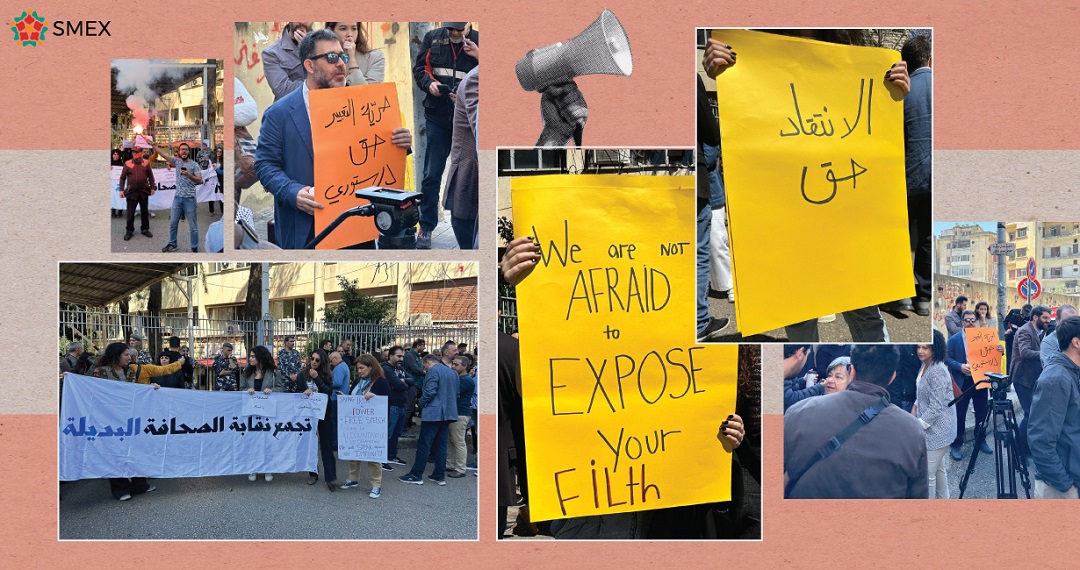Lebanon’s Public Prosecutor Ghassan Oueidat retracted the case against Jean Kassir, the co-founder and managing editor of the news website Megaphone, following a sit-in organized by the Alternative Press Syndicate in front of the Palace of Justice in Beirut on April 3rd.
Last week, journalist Lara Bitar was also summoned based on a complaint by the Lebanese Forces party after publishing an article on life-threatening toxic waste in Lebanon.
Meanwhile, several regions outside Beirut, including Mount Lebanon, are witnessing growing restrictions on the freedom of expression where citizens voicing their objections on social media are being targeted and intimidated.
Is the Judiciary Quick to Act Only against Journalists?
Kassir was informed of the summons by two State Security officers who intercepted his car and forced him to pull over. After identifying themselves as State Security officers, they asked him to sign a notice to appear at the hearing scheduled for Friday, March 31.
Kassir did not attend the hearing. Instead, Megaphone’s attorney Diala Chehade appeared at the Palace of Justice on his behalf to enquire about the complaint and demand that the case be referred to the Court of Publications or a judicial investigator, as these latter are the only parties empowered to prosecute journalists. Chehade later learned that the summons “was not based on a lawsuit, but rather on an order from the Public Prosecutor at the Court of Cassation” Judge Ghassan Oueidat, due to a post published on Megaphone’s social media pages on March 1 under the title “Lebanon Ruled by Fugitives from Justice.”
Attorney Diala Chehade appeared for Kassir’s new summons on Monday and submitted the request to the Court of Publications. Chehade told SMEX that she wanted to “remind the judge in question of the immunity granted to journalists.” She was informed that the judge had issued instructions to ensure the investigation abided by the legal frameworks governing journalistic work. Chehade also learned that no lawsuit had been filed against Megaphone and Jean Kassir, and that the judge only ordered to interrogate Kassir.
As for the editor-in-chief of The Public Source, Lara Bitar, she was summoned to the Cybercrime Bureau based on a complaint filed by the Lebanese Forces after publishing an article on the toxic waste that threatens large areas in Lebanon.
The Cybercrime Bureau was first reluctant to disclose the complainant’s identity during a phone call with Bitar, but after she insisted, the officers informed her that “the Lebanese Forces filed the complaint,” according to what Bitar told SMEX. Bitar explained that the report, published eight months ago, led “several websites affiliated with the Lebanese Forces” to publish articles and issue threats against Bitar and her colleagues at The Public Source. “The Lebanese Forces did not resort to its right of reply according to journalistic custom; rather, they resorted to the judiciary as they usually do to intimidate journalists and activists,” she added.
While Bitar has not yet decided to appear before the Cybercrime Bureau this Thursday, she told SMEX that she will “have further consultations with The Public Source’s legal representative, demand that the case be referred to the Court of Publications and wait to see the outcome of the case against Kassir.”
Journalists’ Immunity Is Unequivocal
The two summons are marred by legal violations, whether in terms of the method of notification or the summoning party. Articles 28, 29 and 30 of Lebanon’s Publications Law, amended in 1994, grant journalists unequivocal immunity and stipulate that they shall only appear before a judicial investigator or the Court of Publications. Chehade said that “journalists should be informed of their rights, particularly those enshrined in this legal text, to prevent them from falling victim to intimidation attempts by security forces and at police stations.”
According to the amended law, “the Court of Appeal shall adjudicate offenses related to publications, and its rulings may be challenged before the Court of Cassation. Preventive detention is not permissible in any publications’ offense. If the case requires an investigation, a judicial investigator shall undertake such investigation and refer the case to the court within a maximum period of five days.”
Attempts are being made to silence journalists and people wishing to express their opinions in Lebanon. According to Chehade, “Judge Oueidat and legislative authorities are trying to intimidate anyone who criticizes them or attempts to uncover cases of corruption that might implicate them. In fact, most of these officials are wanted or are defendants in cases and judicial decisions accusing them of illicit enrichment, embezzlement of public funds and obstruction of judicial investigations.”
“Megaphone did not fabricate any information in the article it published. It only mentioned the judicial decisions issued against politicians and members of the judiciary in Lebanon. So the question is, what is the basis of the complaint? Is it defamation? How can these individuals be summoned without a personal claim against them?” Chehade added.
800 Violations against Journalists in the Past Six Years
The journalists “summoned for interrogation” are backed by several organizations advocating for the freedom of the press. Jad Chahrour, Communications Officer at the Samir Kassir Foundation, believes that “this week’s summons are due to public posts by independent platforms.”
“In the past six years, there have been more than 800 violations against journalists in Lebanon, including severe beatings by security forces, legal and illegal summons, and personal harassment via phones. There is a full-fledged apparatus dedicated to protecting the ruling and murderous regime that refuses to investigate the Beirut Port explosion or other cases,” Chahrour added.
In response to the summoning of journalists, many social media campaigns have been launched using hashtags such as الصحافة_ليست_مكسر_عصا# (the press is not a scapegoat) and عسكر_على_مين# (Who is the police protecting?), coupled with limited protests on the ground. Chahrour confirms that “these actions are necessary to show that journalists are not fighting this battle alone. Everyone should be involved in preserving their right to access information and show support for this cause, which concerns the general public first and foremost.”
In parallel with these summons, Joseph Al-Qusaifi, Head of the Lebanese Press Editors’ Syndicate, announced the 2022 Report on the State of Press Freedoms in Lebanon during a press conference on April 3, but he failed to mention or comment on the recent violations. He considered that “the general framework of freedoms is acceptable in Lebanon.”
Mount Lebanon: Intimidation and Raids
The situation in Beirut and Mount Lebanon is similar: security forces are carrying out arrests and raids to detain activists in Mount Lebanon and the Upper Metn district for posts they published on social media. A source in the region confirmed to SMEX that illegal raids had targeted activists’ homes, who were asked to hand over their phones.
This was the case of activists Chibli Masri and Noura Hassan. Activist Haytham Arbid told SMEX that “the raids in Mount Lebanon are based on a judicial decision to eradicate all forces that support the revolution and the October 17 movements.” Arbid, calling for urgent intervention before these incidents escalate, said that “there are attempts to fabricate cases against activists amid a sectarian discourse that exacerbates tensions. These incidents are carried out by political and partisan forces that are a sort of dictatorship in the region.”
Are security forces safeguarding the interests of sectarian leaders instead of those of Lebanese citizens? In an interview with SMEX, political activist Alaa Sayegh said that “the series of arrests in Mount Lebanon are yet another chapter in the saga of impunity and attempts to erode the judiciary.” Sayegh also revealed that “the Progressive Socialist Party is systematically targeting its critics on social media and intimidating activists by using fake accounts.”
In response to these arrests and raids, some MPs such as Halimé El Kaakour and Elias Jarade took a unified stance, declaring that “these threats and violations against the residents of Mount Lebanon are a pretext to incite one segment of society against the other; these are deplorable and thuggish practices.”
Sayegh concluded by saying that the purpose of these practices, “facilitated by biased members of the judiciary, is to silence those trying to uncover cases of corruption and shed light on the misuse of public funds in associations, endowments and health and educational institutions.”



